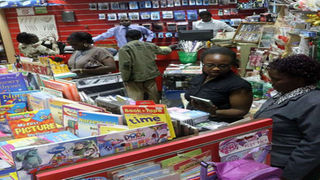
A bookshop in Nyeri town. The Kenya Institute of Curriculum Development on Friday called publishers whose entries won tenders and issued them with confirmation letters.
|Education
Premium
New set books for schools, teacher colleges unveiled
The national curriculum developer has revealed the list of new Literature and Fasihi set books for secondary schools and teacher training colleges.
The Kenya Institute of Curriculum Development (KICD) on Friday called publishers whose entries won the tenders and issued them with letters to confirm the same.
However, the institute has not yet issued an official circular to that effect.
The Nation has established that Fathers of Nations, a novel by Paul B. Vitta and published by Oxford University Press East Africa, has been chosen as the English Literature compulsory text.
It will replace Blossoms of the Savannah by Henry ole Kulet (Longhorn Publishers).
The optional texts are Parliament of Owls (East African Educational Publishers), replacing The Pearl, a novel by John Steinbeck.
A Silence Song and other Stories (Spotlight Publishers), an anthology of short stories, will replace Memories we Lost, edited by Chris Wanjala.
In Kiswahili, Cheche za Moto by John Habwe (Jomo Kenyatta Foundation) will be studied as the compulsory novel, replacing Chozi La Heri by Assumpta K Matei (One Planet Publishers).
Mapambazuko ya Machweo (Mountain Top Publishers) will be the new anthology of short stories, replacing Tumbo Lisiloshiba (Longhorn Publishers).
For teacher training colleges, A Spider’s Web by Samuel Wachira (One Planet Publishers) will be the study novel.
Make corrections
Mzigo wa Kichaa (JKF), a play, and Penzi La Damu (EAEP), a novel, will also be studied at the diploma level in TTCs.
Even after emerging winners, the publishers are still expected to make corrections suggested during the evaluation stage.
The texts will replace those that were introduced in 2018 and will be in use for five years, guaranteeing the winning publishing houses a steady source of income after the government started buying set books for all learners in public schools.
The class sizes at that level average about 750,000 following massive enrolment since the government started the 100 per cent transition policy.
But the revelation comes even as queries over evaluation of bids persist.
Ahead of the award of the bids, some publishers had expressed reservations about how KICD conducts the evaluation and awards the tenders to supply books to schools.
Technical evaluation
After the technical evaluation, where book entries are scored out of 80 per cent, they are then invited to the financial bid where they quote the prices of their books.
The financial bid accounts for 20 per cent.
The lowest bid is awarded the full marks, with other bidders scored according to how they rank against each other.
It is at this stage that publishers engage in cut-throat price wars since, often, the lower the bid, the higher the chances of selection.
This, however, has been counter-productive as it has resulted in greatly reduced earnings for both the publishers and the authors.
In response to previous allegations about corruption in the selection process, KICD introduced ‘blind’ tendering where manuscripts are submitted as spiral-bound copies bearing no identification of the publisher, title of book or the author.





